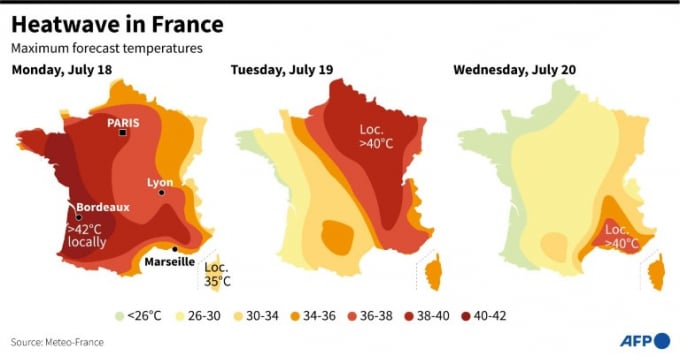June 17, 2025 | 23:23 GMT +7
June 17, 2025 | 23:23 GMT +7
Hotline: 0913.378.918
June 17, 2025 | 23:23 GMT +7
Hotline: 0913.378.918

Britain could hit 40 degrees Celsius for the first time, forecasters said, causing havoc in a country unprepared for the onslaught of extreme heat that authorities said was putting lives at risk.
Britain's current record temperature stands at 38.7 degrees Celsius. Scientists blame climate change and predict more frequent and intense episodes of extreme weather.
Across the Channel, firefighters failed to contain two massive fires in France's southwest that have created apocalyptic scenes of destruction.
For six days, armies of firefighters and a fleet of waterbombing aircraft have struggled against blazes that have mobilised much of France's entire firefighting capacity.
Forecasters have put 15 French departments on the highest state of alert for extreme temperatures, including in the western Brittany region where the Atlantic coastal city of Brest was expected to hit 40 degrees Celsius Monday, nearly twice its usual July temperature average.
The European heatwave, spreading north, is the second to engulf parts of the southwest of the continent within only weeks.
"A HEAT APOCALYPSE"
Blazes burning in France, Greece, Portugal and Spain have destroyed thousands of hectares of land and forced thousands of residents and holidaymakers to flee.
In France's Landes forest, in the southwest Aquitaine region, temperatures "will be above 42 degrees Celsius" on Monday, forecaster Olivier Proust said.
In the Gironde region, further north, firefighters on Monday continued their battle against forest blazes that have devoured nearly 14,000 hectares since Tuesday.
An area of 9km long and 8km wide was still ablaze near the Dune de Pilat, Europe's highest sand dune, turning picturesque landscapes, popular campsites and pristine beaches into a scorching mess.
Firefighters said Monday was shaping up to be one of the most challenging days since the fires started because of the relentless heat, as another 3,500 people were being told to leave their homes as a precaution.
The wildfires in France have forced more than 16,000 people, residents or tourists, to decamp. Seven emergency shelters have been set up for evacuees.
France's interior ministry announced it would send an extra three firefighting planes, 200 firefighters and more trucks.
"In some southwestern areas, it will be a heat apocalypse," meteorologist Francois Gourand told AFP.
The chapel of a historic hospital in the southeast city of Lyon, Grand Hotel Dieu, offered refuge to tourists on Sunday including Jean-Marc, 51, who was visiting from Alsace.
"We came back to admire the place, but we can't leave, it's too hot outside. We say a prayer before the fire!" he quipped.
French cyclist Mikael Cherel, taking part in the Tour de France's 15th stage between Rodez and Carcassonne in southern France on Sunday, said he had "never known such a hot day on a bike".
In Spain, fire burning in the northwestern province of Zamora claimed the life of a 69-year-old shepherd, regional authorities said, the second death after that of a fireman a day before in the same area.
Authorities have reported around 20 wildfires still raging from the south to Galicia in the far northwest, where blazes have destroyed around 4,500 hectares of land.
In Portugal, almost the entire country remained on high alert for wildfires despite a slight drop in temperatures which had hit 47 degrees Celsius - a record for the month of July - last Thursday.
"SO FEROCIOUS"
Fires have killed two, injured around 60 and destroyed between 12,000 and 15,000 hectares of land in Portugal.
In London, the mercury was set to rise to highs of 38 degrees Celsius on Monday as chief meteorologist Paul Davies warned there was a "good chance now of hitting 40 degrees Celsius or 41 degrees Celsius" on Tuesday.
"This is entirely consistent with climate change," he told Sky News, describing the "brutality" of the expected heat as "astounding".
The government, already on the ropes after a series of scandals and Prime Minister Boris Johnson's resignation, drew fresh criticism for failing to take the situation seriously enough.
"This is serious heat that could actually, ultimately, end in people's deaths because it is so ferocious," College of Paramedics chief executive Tracy Nicholls told Sky News.
Many people fled to the beaches, including Abu Bakr, a bank worker, who put the British heatwave into perspective.
"I come from Sudan," he told AFPTV on Brighton beach on Sunday. "Forty, forty-five degrees is just the norm. This is as good as it can be."
(AFP)

(VAN) Extensive licensing requirements raise concerns about intellectual property theft.

(VAN) As of Friday, a salmonella outbreak linked to a California egg producer had sickened at least 79 people. Of the infected people, 21 hospitalizations were reported, U.S. health officials said.

(VAN) With the war ongoing, many Ukrainian farmers and rural farming families face limited access to their land due to mines and lack the financial resources to purchase needed agricultural inputs.

(VAN) Vikas Rambal has quietly built a $5 billion business empire in manufacturing, property and solar, and catapulted onto the Rich List.

(VAN) Available cropland now at less than five percent, according to latest geospatial assessment from FAO and UNOSAT.

(VAN) Alt Carbon has raised $12 million in a seed round as it plans to scale its carbon dioxide removal work in the South Asian nation.

(VAN) Attempts to bring down the price of the Japanese staple have had little effect amid a cost-of-living crisis.